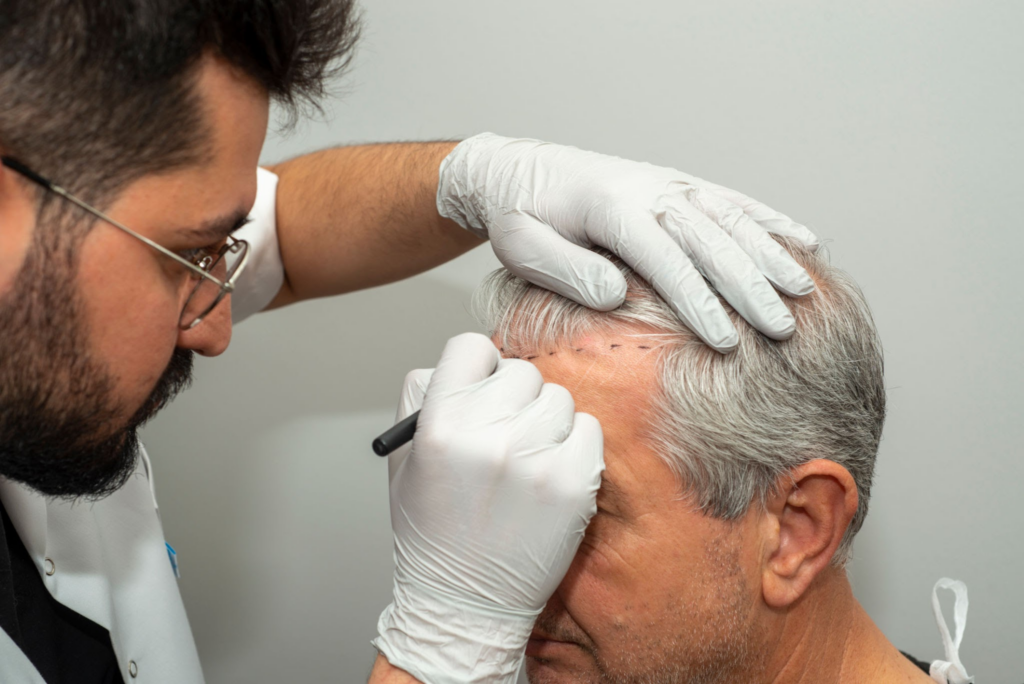Hair loss can be a significant cosmetic concern for both men and women. While there are various hair loss treatments available, hair transplant surgery has emerged as a highly sought-after solution for achieving a permanent and natural-looking restoration of your hairline.
However, with the growing popularity of hair transplants, a crucial question arises: where to undergo this procedure? Two prominent destinations have captured the global market’s attention – the United Kingdom (UK) and Turkey. This article delves into a comprehensive comparison of these two countries, empowering you to make an informed decision for your hair transplant journey.

İçindekiler
Factors to Consider When Choosing a Hair Transplant Destination
Cost:
Price is undeniably a significant factor for many considering hair transplant surgery. Here’s a breakdown:
- UK: Due to a higher cost of living and surgeon fees, hair transplants in the UK tend to be considerably more expensive.
- Turkey: Turkey boasts a substantially lower cost of living, translating into significantly lower hair transplant surgery costs compared to the UK.
Experience and Qualifications:
Surgeon expertise is paramount for a successful hair transplant outcome. Both the UK and Turkey have a pool of qualified surgeons. Here’s a closer look:
- UK: The UK has established regulatory bodies ensuring surgeons possess the necessary qualifications and experience. Extensive research into the surgeon’s background and accreditations is recommended.
- Turkey: Similar to the UK, Turkey has regulatory bodies overseeing the qualifications of hair transplant surgeons. However, thorough research into the chosen clinic and surgeon’s credentials is essential due to the sheer volume of clinics in the country. Look for surgeons affiliated with international hair transplant organizations for added peace of mind.
Procedure Techniques:
Both FUE (Follicular Unit Extraction) and FUT (Follicular Unit Transplantation) are the two main hair transplant techniques offered in both the UK and Turkey.
- FUE: This minimally invasive technique extracts individual follicular units from the donor area, minimizing scarring. Both the UK and Turkey offer FUE procedures.
- FUT: This technique involves removing a strip of scalp from the donor area, which is then dissected into follicular units for transplantation. While FUT is still offered in some clinics, FUE is generally the preferred option due to its minimally invasive nature.
Clinic Facilities and Aftercare:
Modern, well-equipped clinics are crucial for a safe and comfortable hair transplant experience.
- UK: Established clinics in the UK typically possess state-of-the-art facilities and offer comprehensive aftercare support.
- Turkey: The influx of patients has led to a surge in hair transplant clinics in Turkey. While many offer high-quality facilities, careful research is vital to ensure the chosen clinic prioritizes patient safety and aftercare services. Look for clinics accredited by organizations like JCI (Joint Commission International).
Travel and Recovery Considerations:
- UK: Undergoing surgery in your home country offers the convenience of minimal travel and recovery within familiar surroundings.
- Turkey: Traveling to Turkey for a hair transplant can be an attractive option due to the cost savings. However, factor in travel logistics and post-operative recovery time spent away from home.

Choosing the Right Destination for You
Advantages of a Hair Transplant in the UK:
- Established Regulatory Framework: The UK’s healthcare system has a well-defined regulatory structure, offering some patients peace of mind regarding surgeon qualifications and clinic standards.
- Reduced Language Barrier: Communication with the surgeon and clinic staff is simplified if English is your primary language.
- Minimal Travel Disruption: Recovering from surgery in your home country allows for a familiar environment and support system.
Advantages of a Hair Transplant in Turkey:
- Significant Cost Savings: Hair transplant surgery in Turkey is often considerably cheaper compared to the UK.
- Advanced Techniques Widely Available: Many Turkish clinics offer advanced FUE techniques with impressive results.
- Focus on Medical Tourism: The influx of medical tourists has led to an increase in clinics catering to international patients, potentially offering more inclusive packages and travel arrangements.
Important Considerations Before Making Your Decision
Regardless of your chosen destination, prioritizing in-depth research is paramount. Here are some crucial aspects to consider:
- Surgeon’s Qualifications and Experience: Seek out surgeons who are members of recognized hair transplant organizations, such as the International Society of Hair Restoration Surgery (ISHRS) or the American Board of Hair Restoration Surgery (ABHRS), and have a proven track record of successful procedures. Look for surgeons who actively participate in ongoing training and research within the field of hair transplantation.
- Clinic Accreditation: Choose clinics accredited by reputable organizations like the Joint Commission International (JCI). This accreditation ensures the clinic adheres to rigorous international healthcare standards, encompassing aspects like patient safety, staff qualifications, and facility hygiene.
- Realistic Expectations: Hair transplant surgery is an investment in both time and money. During your consultation, discuss realistic hair restoration goals with your surgeon. It’s crucial to have a clear understanding of what can be achieved and the timeframe for visible results. Request to see a comprehensive portfolio of the surgeon’s before-and-after photos to gauge their artistic skills and ability to achieve natural-looking hairlines.
- Procedure Cost Transparency: Ensure all-inclusive pricing is provided upfront by the clinic. This should encompass surgeon fees, medication costs, post-operative care instructions, and any potential follow-up appointments. Beware of hidden costs or pricing structures that seem too good to be true.
- Language and Communication: If English is not your primary language, inquire about the clinic’s communication protocols. Do they have staff members who can translate consultations and post-operative instructions? Ensure you feel comfortable communicating clearly with your surgeon and clinic throughout the entire process.
- Aftercare Support: A reputable hair transplant clinic will prioritize aftercare support to ensure optimal healing and results. Inquire about the details of their aftercare program, including medications, wound cleaning instructions, and access to the surgeon or clinic staff for any questions or concerns that may arise post-operatively.
By carefully considering the factors outlined above, you can make an informed decision about the best destination for your hair transplant surgery. Whether the UK or Turkey aligns better with your priorities depends on your individual circumstances, budget, and recovery preferences. Remember, prioritizing surgeon expertise, clinic accreditation, and realistic expectations will contribute significantly to a successful and positive hair transplant experience.

Consultation and Follow-Up Care
Following your initial research, scheduling consultations with qualified surgeons in your chosen destination is the next step.
- Consultation: During the consultation, the surgeon will thoroughly evaluate your scalp, hair loss pattern, and overall health to determine your candidacy for a hair transplant. This is an excellent opportunity to discuss your desired outcomes, ask questions, and address any concerns you may have.
- Follow-Up Care: A crucial aspect of a successful hair transplant journey is adhering to the post-operative instructions provided by your surgeon. This typically involves medications to promote healing, proper wound care techniques, and attending follow-up appointments to monitor progress.
The Takeaway
Hair transplant surgery can be a life-changing procedure for those struggling with hair loss. By carefully weighing the advantages and disadvantages of undergoing surgery in the UK or Turkey, combined with prioritizing surgeon qualifications, clinic accreditation, and realistic expectations, you can embark on a hair transplant journey with confidence and achieve a natural-looking, permanent solution for your hair loss concerns.
A Visual Comparison: UK vs. Turkey for Hair Transplant Surgery
Here’s a table summarizing the key points of comparison between having a hair transplant surgery in the UK and Turkey:
| Feature | UK | Turkey |
|---|---|---|
| Cost | Generally more expensive | Significantly more affordable |
| Surgeon Qualifications | Established regulatory framework | Research crucial, prioritize international affiliations |
| Procedure Techniques | FUE widely available, FUT less common | Advanced FUE techniques prevalent |
| Clinic Facilities | Established clinics with modern equipment | Wide range of clinics, thorough research recommended |
| Aftercare Support | Typically comprehensive | May vary, prioritize clinics with strong aftercare programs |
| Travel & Recovery | Minimal travel disruption | Consider travel logistics and recovery time abroad |
| Language Barrier | Reduced for English speakers | Potential language barrier, inquire about translation services |
Additional Considerations for Turkey
If Turkey emerges as your preferred destination, here are some supplementary pointers:
- Hair Transplant Packages: Many Turkish clinics offer all-inclusive packages encompassing surgery, accommodation, and airport transfers. Scrutinize the inclusions and exclusions carefully before committing.
- Cultural Considerations: Familiarize yourself with basic Turkish phrases and customs to enhance your overall experience in Turkey.
- Visa Requirements: Depending on your nationality, you may require a visa to enter Turkey. Research visa requirements well in advance of your planned surgery date.

Conclusion
By undertaking thorough research, prioritizing surgeon expertise, and carefully considering the factors outlined above, you can embark on a successful hair transplant journey, whether you choose the UK or Turkey. Remember, this is an investment in your confidence and appearance, so take your time, ask questions, and make an informed decision that aligns with your individual needs and expectations.
Hairtrans.com was founded by world-famous plastic surgeon Dr. MFO, who is an expert in facial feminization or facial masculinization surgeries, and is managed under his leadership. Would you like to have a hair transplant under the coordination of a plastic surgeon with many years of experience?
Whether you are a trans woman or a natural born male or female, if you are looking for the best hair transplant, contact us now.
Frequently Asked Questions (FAQs) about Hair Transplants in the UK and Turkey
1. What are the main differences between FUE and FUT hair transplant techniques?
FUE (Follicular Unit Extraction) is a minimally invasive technique where individual follicular units are extracted from the donor area. This leaves minimal scarring compared to FUT (Follicular Unit Transplantation), which involves removing a strip of scalp from the donor area for extraction of follicular units. FUE is generally the preferred option due to its less noticeable scarring.
2. How long does hair transplant surgery typically take?
The duration of hair transplant surgery can vary depending on the number of grafts being transplanted. A typical FUE procedure for a smaller area can take several hours, while a larger or more complex procedure may take an entire day.
3. What is the recovery time after a hair transplant?
Most patients experience some scabbing and redness in the donor and recipient areas following surgery. This typically resolves within a few days. Strenuous activity should be avoided for the first few weeks, and a full recovery can take several months as the transplanted hair follicles establish themselves and begin to grow.
4. Are the results of hair transplants permanent?
Hair transplants involve transplanting healthy hair follicles from the donor area to the recipient area. These transplanted follicles are genetically resistant to balding, so the newly transplanted hair will grow permanently. However, the existing hair outside the transplanted area may continue to thin or recede over time.
5. What are some potential risks and side effects of hair transplant surgery?
As with any surgery, there are potential risks associated with hair transplants, such as infection, bleeding, and scarring. It’s crucial to choose a qualified surgeon and adhere to all pre- and post-operative instructions to minimize these risks. Temporary side effects may include swelling, discomfort, and crusting around the transplanted areas.
6. How can I finance a hair transplant?
Some clinics may offer financing options for hair transplant surgery. It’s advisable to explore various financing options and choose one that aligns with your budget and financial circumstances.
7. What ongoing maintenance is required after a hair transplant?
Following a successful hair transplant, a healthy lifestyle that promotes overall hair health is recommended. This may include maintaining a balanced diet, managing stress levels, and using hair care products specifically formulated for transplanted hair.
By addressing these FAQs, we hope to empower you to make an informed decision about your hair transplant journey.


